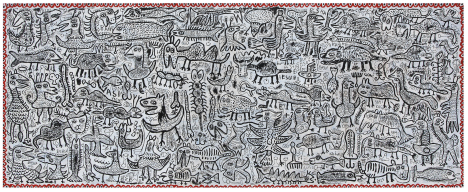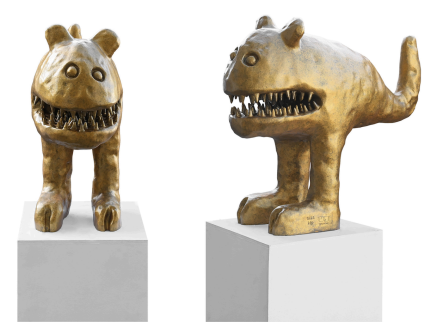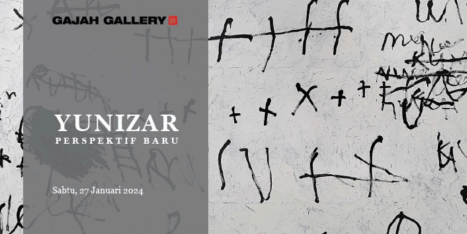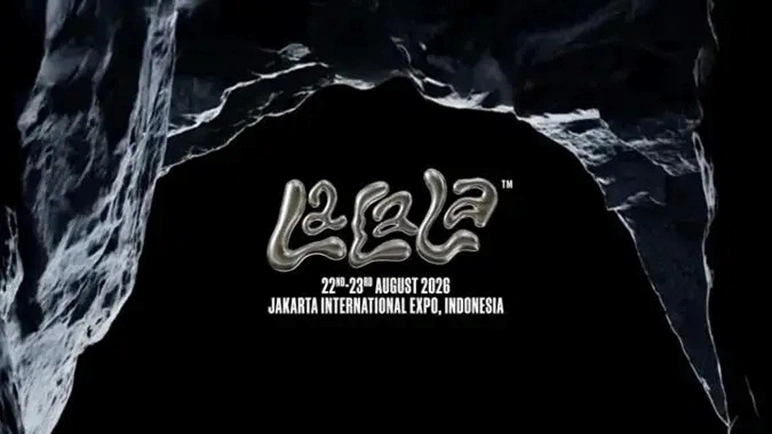Gajah Gallery is delighted to launch a comprehensive exploration of the illustrious two-decade oeuvre of acclaimed Indonesian contemporary artist Yunizar in Bahasa Indonesia. Edited by the distinguished historian T.K. Sabapathy, the book brings together the writings by renowned scholars: T.K. Sabapathy, Aminudin T.H. Siregar, Ahmad Mashadi, and Katherine Bruhn. 'Yunizar: Perspective Baru’ initially launched in Singapore last year under the title ‘Yunizar: New Perspective’, marking a significant milestone in the art world's appreciation of Yunizar's remarkable body of work. The book launch is scheduled to take place on Saturday, 27 January 2024, at Gajah Gallery Jakarta.
As Yunizar continues to gain momentum in the art world, he remains a singular voice in Indonesia’s contemporary art history. His artistic journey took off in the late 1990s, during a period when the fall of former President Soeharto triggered an art world heated with the socio-political issues of the time. Yunizar’s haunting early work, however, resisted the noise and didacticism of political art. He chose instead to focus not on grand, heroic narratives, but on the richness of the everyday. From falling fruits to mad dogs to anonymous, alienated people, his subjects may have been mundane—but his paintings were filled with emotional tension and a plethora of meaning. Radically subverting conventional notions of beauty, Yunizar imbued his canvases with smudges, muted earthy colours, and raw, crude lines and figures. The deceptive simplicity of this visceral style, paired with the psychological depths and elusiveness of his subjects, is ultimately what persists to make his works compelling.
The works on display capture the unique trajectory and milestones of Yunizar’s career: from his paintings of enigmatic figures in dark, archaic colours from the late 1990s, his Coretan works that infuse rhythmic, ‘unreadable’ scribbles and draw our attention to the expressive power of texts; to his bold, eccentric bronze sculptures that he developed in the 2010s. Yet, they also reveal how Yunizar’s evolution is far from linear. Traces of Yunizar’s Coretan series have emerged since the 1990s, and continue to surface in his work today. Curators and writers praise these impressionistic writings as resisting fixed, conventional meanings; rather, they capture more profound kinds of communication. The complexities of these works are thus a testament to how there is still much to unpack in the works of Yunizar—prompting the need for ‘new perspectives’.

The seminal book provides a rigorous examination of the deeper and broader implications of Yunizar’s work. Aminudin T.H. Siregar contextualises Yunizar within the pioneering art collective KSR Jendela, tracing his connections with its members whose rich synergies buttressed his confidence as a young artist. He highlights nuances in Yunizar’s evolution over the years, and situates his oeuvre within the broader contexts of Indonesian art history. Katherine Bruhn’s interview with Yunizar, recalling his childhood in Talawi, West Sumatra, offers a particularly revealing account of his youth and how he emerged as an artist from his unique artistic heritage in West Sumatra.
Spotlighting a vital moment in his career, T.K. Sabapathy traces Yunizar’s unexpected, yet steady expansion into three-dimensional art practice—unpacking the fluid impact of his paintings, which dominates his oeuvre on producing sculptural forms and compositions, and analysing his distinct figural sculptures. Finally, Ahmad Mashadi presents a fascinating historiographical account of debates surrounding KSR Jendela’s significance—ultimately launching a critical discussion on how the emergence of the group opens up dynamic entry points into deeper understandings of Indonesian modern and contemporary art.
The book ultimately marks 15 years worth of critical and institutional acclaim for Yunizar, both within Southeast Asia and across the globe. In 2007, he held a solo show at the National University of Singapore Museum (NUS Museum), Singapore. His works are currently found in the collections of major art institutions, such as the Singapore Art Museum (SAM), the Long Museum in Shanghai, and the Benesse Art Collection in Japan. Most recently, in 2021, he was the only Southeast Asian artist selected to participate in Frieze Sculpture, London.

About the Artist
Yunizar (b. 1971, Indonesia), born in Talawi, West Sumatra, earned his fine arts degree at the Indonesian Institute of Arts in Yogyakarta–a school of national pride in the heart of Indonesia’s artistic and cultural capital. During his studies, Yunizar co-founded an art group called the Kelompok Seni Rupa Jendela, together with five other Minang students. Amid the socio-political art that flooded the Indonesian art world after the 1998 Reformation, which saw the fall of the Suharto regime, the KSR Jendela crucially avoided overtly political themes. Instead, the group acted as a sanctuary for the artists to exchange ideas, experiment with form and material, and hone their distinct artistic sensibilities. By the late 1990s, the works that Yunizar produced were a breath of fresh air. Resisting grand, heroic narratives and didactic messages in his work, Yunizar set his gaze instead on the every day—determined to articulate the feeling and essence, or rasa, of subjects that animated his immediate surroundings.
Yunizar’s crude, childlike style, composed of raw lines and fantastical imagery, may appear naive at first glance, but in fact radiates deep mystery and elegance. His paintings from the early 2000s portrayed haunting human figures in dark, muddy colours, capturing the psyche of anonymous, alienated people. In the mid-2000s, fascinated by vandalisms on bathroom stalls and street corners, Yunizar began incorporating rhythmic, impressionistic scribbles in his paintings, known as his Coretan or “unreadable letters” series. Evading meaning and literal translations, these writings instead evoked an emotional force akin to what one might find in oral traditions, which have a long history within the Minangkabau culture.
Over the years, Yunizar has carefully transformed his practice, exploring motifs that increasingly collapse boundaries between the real and the imaginary—from homes and dwellings to mythical creatures such as the symbolically charged Garuda, enshrined on Indonesia’s national emblem. Then, in 2012, Yunizar unexpectedly ventured into sculpture. Since then, he has transformed whimsical subjects, such as village gangsters and primordial monsters, into arresting bronze creations.
About Gajah Gallery
Founded in 1996, Gajah Gallery has remained at the forefront of the Southeast Asian art scene, with premiere exhibitions curated by the region’s leading academics and art historians. The gallery programme extends across three locations (Singapore, Jakarta, Yogyakarta) and continues to support the work of Southeast Asian artists through a full calendar of exhibitions each year, including invitations to regional and international platforms of the highest calibre. Over the years, the gallery has reinvigorated academic contributions to the category of Southeast Asian art and history. It has held landmark shows such as 5th Passage: In Search of Lost Time; I GAK Murniasih: Shards of My Dreams That Remain in My Consciousness; Heresy or Codswallop, A Solo Exhibition by Ashley Bickerton; Semsar Siahaan: Art, Liberation; Lokanat: Ground Zero; and Intersections: Latin American and Southeast Asian Contemporary Art, as well as supporting the production of extensive printed publications on seminal Indonesian artists and collectives, such as Yunizar: New Perspectives.
Furthermore, Gajah Gallery has collaborated with several national institutions, holding exhibitions on Yunizar and the Jendela Art Group at the National University of Singapore (NUS) Museum in 2007 & 2009, and Srihadi Soedarsono’s joint show with Chua Ek Kay at the Singapore Art Museum in 2005.
Casa Domaine, GF Retail, Jl. K.H. Mas Mansyur No.1, RT.6/RW.8, Karet Tengsin, Jakarta, Kota Jakarta Pusat, Daerah Khusus Ibukota Jakarta 10250




 Angelina Agata
Angelina Agata
 Jan 18, 2024
Jan 18, 2024





